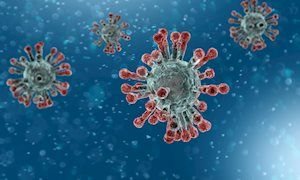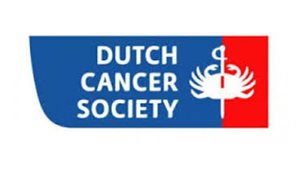
Four researchers from Radboudumc received a phone call from Hubert Bruls, Mayor of Nijmegen, in the morning of Monday 26 April. He announced that they will receive a royal decoration because of their exceptional scientific and/or social merits.
Appointed as Knight of the Order of the Netherlands Lion are:
- Nicoline Hoogerbrugge, theme Tumours of the digestive tract, RIMLS
- Jolanda de Vries, theme Vascular damage, RIMLS
- Koos van der Velden, RIHS
- Jan Buitelaar, theme Neurodevelopmental disorders, DCMN

Nicoline Hoogerbrugge joined the Radboudumc in 1999 after she had worked as an internist at the ErasmusMC in the field of prevention of cardiovascular diseases. At the Radboudumc she started to focus on hereditary cancer; at the time a new field of study that focused on the early detection or prevention of tumors in patients with a hereditary predisposition to develop tumors.
In 2009 Nicoline Hoogerbrugge was appointed Professor of Hereditary Cancer. Since 2010 she has been a chain owner of hereditary cancer at the Radboudumc and in 2015 she became head of the Radboudumc Expertise Center for Hereditary Cancer. Within the Radboudumc Center for Oncology she represented the interests of preventive oncology for many years as a member of the board.
Nicoline Hoogerbrugge is a passionate physician and scientist. She is committed to her patients and colleagues and to the development of her profession. Under her wings, the Family Tumors Outpatient Clinic in the Radboudumc has taken shape and awareness of a possible hereditary predisposition and its consequences for patients and their families has greatly increased.
Again and again Nicoline Hoogerbrugge develops initiatives that are copied elsewhere in the country and improve the care for people with hereditary cancer. Her efforts as (deputy) chairman of the Hereditary Bowel Cancer Guidelines Committee, for example, have led to the Netherlands being one of the first countries in which - in the case of bowel tumours that develop at a young age - standard screening is carried out for characteristics of a hereditary predisposition: a concept that was considered controversial by many at the time.
In addition, Nicoline Hoogerbrugge is also president of the European reference network genetic tumor risk syndromes (ERN GENTURIS). In this network, healthcare professionals work together with patient organizations to better recognize and treat individuals with a hereditary predisposition to cancer. Under her chairmanship, ERN GENTURIS has grown into a very active network.
Nicoline Hoogerbrugge is a medical specialist who puts her talent at the service of many and who does much to realize her ideal: preventing cancer where possible, and providing optimal treatment where necessary.

Jolanda de Vries joined Radboudumc in 1997 in the Department of Tumor Immunology at the Center for Molecular Life Sciences Nijmegen, after receiving her PhD from 1991 to 1997 from the Department of Dermatology at the University Medical Center Utrecht. She was a pioneer from the beginning in translating dendritic cell biology into potential clinical applications.
Jolanda de Vries is a leader in tumor immunology research. She is one of the few experts in the field of cellular cancer vaccines, particularly dendritic cell vaccines. One of De Vries' successes has been the preventive vaccination of healthy carriers of Lynch syndrome, people who are at high risk of developing cancer at a young age. Another important result is the conditional admission to the basic health insurance package of treatment of skin cancer with dendritic cells from the blood. This allows for a randomized phase III study to be conducted.
Jolanda de Vries was also the first to use imaging techniques to study the effect of dendritic cells after administration in patients. For example, she showed how important the route of administration of cellular vaccines is for maximum effect.
Jolanda de Vries knows how to inspire students as well as PhDs and postdocs with different backgrounds (medical, biomedical, chemical). She is very active in informing clinicians, patients and other interested parties about the results of her research. She regularly gives lectures for patients, patient organizations and healthcare professionals. In addition, she has also taught classes in elementary schools to get children from 8 to 10 years old excited about science.
Developing cellular therapy for patients requires not only biological knowledge about the cell type, but also knowledge about how to produce drugs. In particular, knowledge is needed about the development of so-called advanced therapy medicinal products (ATMPs), which includes dendritic cell therapy. Because Jolanda de Vries is one of the few who has this knowledge, her help is requested almost every week by other scientists from the Netherlands and abroad.
Within the Department of Tumor Immunology, of which she has been Department Head since 2019, Jolanda de Vries leads the research group Human Immunology: Research and Clinical development. With the help of her VIDI, Aspacia and VICI grants, she has built a successful research team, with researchers from all over the world. Jolanda has also established international exchange programs, which have led to exchanges of postdocs, PhDs and students, and resulted in several joint publications and grants.

Koos van der Velden was a professor of Public Health at the Radboudumc from 2004 to 2018. Before that, he had already built an impressive career in which a strong international orientation
and tropical diseases are a common thread.
The flu is the most important infectious disease in the (Western) world and responsible for a high mortality rate. In a WHO context, Koos van der Velden was at the cradle of a surveillance system that has since grown into a collaborative network between 53 European countries headquartered in Stockholm. This surveillance network provides training and detects viruses.
Prof. Van der Velden's name is also inextricably linked to birth care. A few years ago it was noted that the Netherlands had a high infant mortality rate, the highest in Europe. The mortality rate was twice as high as in countries comparable to the Netherlands such as Denmark and Finland, 9.7 per 1000 in the Netherlands and in Finland, for example, 4 per 1000. ln a report drawn up under the chairmanship of Koos van der Velden, a number of causes were identified, such as lifestyle, but also the organization of care around childbirth. The report led to a number of actions to improve collaboration in maternity care, to form networks and also to do what was necessary in the sphere of prevention.
He also fulfilled his tasks within the Radboudumc with verve, for example he was for many years chairman of the committee that evaluated proposals for the position of Associate Professor and he has ensured that the position of Associate Professor now occupies a prominent place within the Radboudumc.

Jan Buitelaar has worked at Radboudumc since 2002 and as a child and adolescent psychiatrist has meant a lot to many children and their families. His research has made significant strides in the biological understanding of ADHD and autism.
Jan Buitelaar has published hundreds of scientific articles and book chapters, which have had a major impact on his field. This is partly due to his innovative way of working: setting up large-scale cohorts of patients, their siblings and control subjects, on the basis of which Buitelaar's team uncovered the genetic and neural underpinnings of developmental disorders. For example, Jan Buitelaar developed a screening questionnaire to detect autism at an early stage. He was also one of the first to demonstrate that ADHD also occurs in adults. Jan Buitelaar also developed an elimination diet for children with ADHD, which has been the impetus for much subsequent research into the relationship between nutrition and the brain.
Jan Buitelaar is very passionate about bringing his research into the limelight. Typical of his social commitment is his plea in the media for attention to the relationship between poverty and mental health.
Authority
His research, teaching and community involvement have inspired and helped many practitioners, researchers, patients and their families. Based on his scientific discoveries, the next generation of researchers and academics will be able to develop new solutions in the field of diagnostics and treatment. Jan Buitelaar's contribution will thus ease the burden of psychiatric disorders in young people and reduce the stigma of psychiatry in society.
Jan Buitelaar is the Dutch authority in child and adolescent psychiatry. In addition to direct clinical care, the task he most frequently undertook when asked, he also developed the diagnostic and therapeutic guidelines as chairman of the national knowledge center for child and adolescent psychiatry, vice chairman of the ADHD World Federation, member of the European ADHD guideline group and the scientific council of the European College of Neuropsychopharmacology.
Read more about the Royal decorations at the Radboudumc and Radboud University: link. (Dutch)
Related news items

Turbo Grants for four medical-technical research projects
19 October 2021 Four TURBO grants were recently awarded to new technical-medical research proposals. The grants are part of the TURBO program, a collaboration between the University of Twente (TechMed Centre) and the Radboudumc. read more
Cooling strategies for COVID-19 health personnel to attentuate PPE-induced heat strain
11 June 2020 Radboudumc develops infographic with cooling information read more
KWF Roadshow 11 November 2019
10 October 2019 In which way(s) can KWF provide optimal support to oncological research and care? How can we maximize impact on our investments? These questions are pivotal in Ambition 2030: the vision that KWF developed in close cooperation with stakeholders in the oncological field. read more
Awarded KWF grants for Radboudumc researchers
2 July 2019 The Dutch Cancer Society (KWF) has awarded 25.5 million euros to 50 new research projects in 16 different institutes. 8 grants are awarded to Radboudumc researchers. We congratulate our researchers with this funding and wish them success with their great work. read more
Internal KWF review procedure 2020
13 June 2019 In agreement with the existing policy the research board and Radboud Center for Oncology have decided to continue with the mandatory internal review procedure for KWF grant applications. read more
